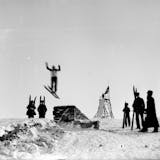For Vikings fans, the season has been an unexpected joy. Must that mean heartbreak lurks?
LIMITED-SERIES PODCAST
GHOST OF A CHANCE
Coming January 13: Reporter Eric Roper's journey to uncover the history of a Black couple who owned his Minneapolis home in 1917, and the deeper lesson of race in the city.

For Vikings fans, the season has been an unexpected joy. Must that mean heartbreak lurks?
Beyond the frustration over health care elevated by a CEO’s shooting, of all things, is the breakdown of that basic social contract.
First-rate oysters, crab legs, steak, duck and more from these Twin Cities restaurants and stores can be yours at bargain prices if your timing is right.
Games & Comics
See MoreFeatured Videos
Pulse oximeters helped drive racial inequities in care during the pandemic, but many devices at drugstores and online won’t be subject to the guidelines.

















